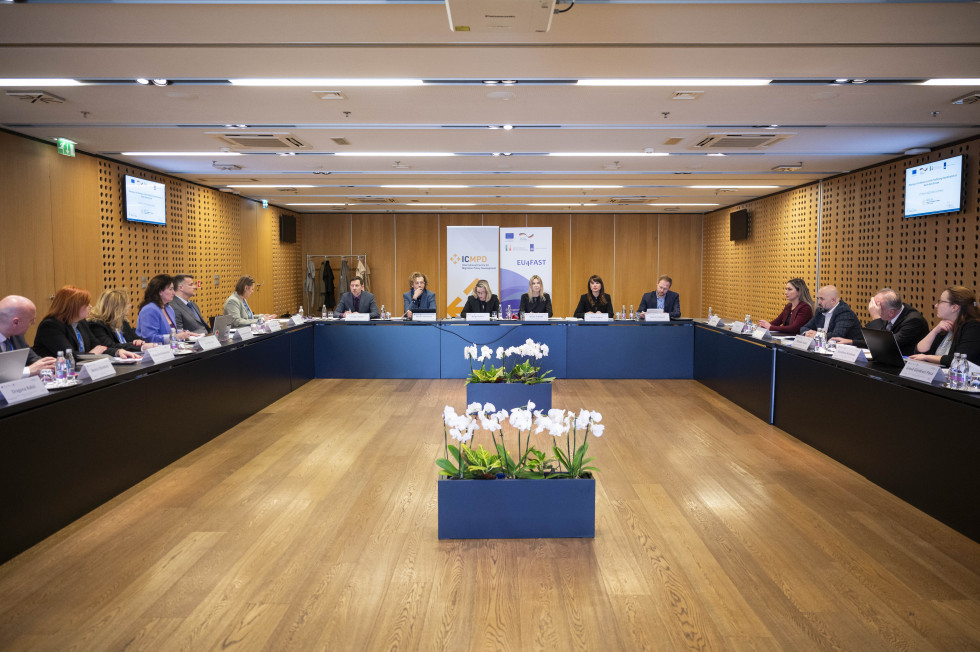Network of Anti-Trafficking Coordinators of South-East Europe adopts a new Strategy Paper
At today's meeting, the Network that was established on Slovenia's initiative and has been active for 15 years, adopted a new strategy paper for the period 2025-2029.The strategy focuses on strengthening strategic and operational cooperation in the region, including cooperation in joint awareness-raising information campaigns, joint monitoring activities on the ground and joint processing of concrete cross-border cases. The Slovenian National Coordinator also noted that the strategy paper is more ambitious than the previous one, especially as regards the possibility of enlarging the network to countries in conflict or along migration routes. "It also allows for cooperation with and involvement of the private sector, aims for standardisation of data collection methodologies, and focuses on technological challenges. In order to achieve these objectives, we also need to think about developing a joint action plan that will provide detailed implementation plan of the core activities."
Trafficking in human beings remains one of most serious violations of human rights in the modern world. In the past, trafficking in human beings in the EU primarily focused on sexual exploitation. Today, the victims are increasingly facing labour exploitation, forced participation in criminal activities and forced begging. A growing number of men are becoming victims of trafficking, especially for the purpose of labour exploitation in construction, agriculture and other sectors of economy. Current trends in the European Union and beyond sadly show that human trafficking is not declining, but is constantly adapting and changing its methods. Digitalisation has introduced new challenges as trafficking is increasingly moving to online platforms and social networks, where victims are even more vulnerable," Helga Dobrin also said.
In recent years, the migration routes in the Western Balkans have become the main transit areas for many, who seek safety and better opportunities in the European Union. Sadly, these routes are also targeted by organised criminal groups, who see irregular migration as an opportunity for trafficking in human beings. Irregular migration often involves people smuggling. Criminal groups organise illegal border crossings in exchange for payment. "Migration and trafficking in human beings are serious issues in the Western Balkans. They require regional and international cooperation and active engagement of our network is of vital importance," Helga Dobrin highlighted and emphasised the importance of identifying the victims of human trafficking among the persons seeking international protection.
The Executive Director of the European Union Asylum Agency Nina Gregori shared the experiences regarding this issue. Under the Common European Asylum System the victims of trafficking in human beings are recognized as a particularly vulnerable group requiring special attention throughout the asylum and reception procedures. Their experiences of exploitation – from forced labour and sexual exploitation to forced marriages – demand a tailored and sensitive approach that prioritizes their protection, safety, and dignity.
The meeting was also attended by European Union Anti-Trafficking Coordinator Diane Schmitt, who presented new developments in this field in the European Union, assessed cooperation with non-EU countries and expressed her support for the work of the Network of Anti-Trafficking Coordinators of South-East Europe.
As Helga Dobrin explained, the meeting was an opportunity for an in-depth discussion on the challenges and the next steps in the implementation of the new five-year strategy. "Only by working together can we create an environment where trafficking in human beings is prevented and victims receive the security, justice and dignity they deserve."
On the sidelines of the conference, the National Coordinator Helga Dobrin also held bilateral meetings with the European Union Anti-Trafficking Coordinator Diane Schmitt and the representatives of the International Centre for Migration Policy Development. The meetings confirmed the good cooperation and reaffirmed continued efforts for the future.
Background
The Network of Anti-Trafficking Coordinators of South-East Europe has been successfully contributing to the prevention of trafficking in human beings in the region for 15 years. The main guideline of the informal network is to discuss current trends and challenges in countering trafficking in human beings, to develop and maintain mutual contacts, and to cooperate in joint projects.
Slovenia attaches great importance to efficient international cooperation in tackling trafficking in human beings, on both the operational and the strategic level. Cooperation on the strategic level is especially dynamic in the framework of the EU's Network of National Rapporteurs and Equivalent Mechanisms against trafficking in human beings, and in the framework the informal Network of Anti-Trafficking Coordinators from South-Eastern Europe. Further strengthening of regional cooperation in the field of anti-trafficking will also be discussed by the ministers of the interior of the Brdo Process at tomorrow's ministerial meeting.

The South East Europe Network of National Anti-Trafficking Coordinators has been successfully operating for more than 15 years. | Author Boštjan Podlogar, STA

